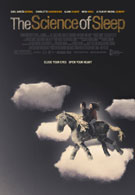The mind of Michel Gondry may be a scary place to live, but it's a lovely place to visit. Two years after the brilliantly warped film Eternal Sunshine of the Spotless Mind, Gondry directs his first full-length screenplay about an artistic man who can't hack it in the real world, as his vivid dreams spill over into his real life. With the semi-autobiographical The Science Of Sleep—and without Charlie Kaufman to lean on—he is left to his own devices, and ecstatically bangs it out of the park.
The Science Of Sleep is a near-perfect mix of fantasy and brutal honesty, with alluring visuals to lessen the blow of the punches. It's like a cross between Heavenly Creatures and Vanilla Sky, with a pinch of acid tossed in. The film opens with a wacky TV show called "Stephane TV," set on a soundstage made from household objects. The host is Stephane (Gael Garcia Bernal), and today's show is about the recipe for dreams, as he throws a variety of ingredients—random thoughts, memories, songs, etc—into a large steaming pot. It's his show and he'll dabble in science, bang the drums, and charm the pants off viewers if he wants to.
Only that's not his real life; that's the stuff that dreams are made of. The actual Stephane is shy, awkward, and moving back to his childhood home in Paris after his mom (Miou-Miou) lures him there under false pretenses. He believes he has a creative job lined up with a calendar publisher, but when he arrives, he finds a menial position where he "glues in a basement all day." After returning from his thankless work, he is repaid by a piano tumbling down the stairs in his direction, courtesy of a few clumsy movers. On the plus side, a blonde named Zoe (Emma de Caunes) and a brunette named Stephanie (Charlotte Gainsbourg) take care of him for the afternoon—a side-effect that he doesn't seem to mind.
He is initially drawn to Zoe, who doesn't return his affections ("I never get the one I like," he mopes) but his focus shifts to Stephanie, a kindred spirit who shares his view of the world as an artistic playground. The key difference between The Science Of Sleep and Eternal Sunshine is that this movie is not about two people who are madly in love and struggling to make it work; it's about two people that really shouldn't be together and at least one of them knows it. The other, Stephane, is too caught up in his illusions and surreal dreams to be able to function in a relationship, let alone society. Some of his behavior, such as breaking into her bedroom to repair her toy horse, would probably warrant legal action if he weren't so cute.
Although The Science Of Sleep delves into tortured love affairs and the fight for creative spirits to survive in a corporate world, it's loaded with humor and imagination. At least half of the movie warps into the alternate reality that Stephane dreams about, where stunning visuals feature entire cardboard cities, animated disasters happening outside of a window, and boats drifting over seas of cellophane. There are different kinds of eye candy, ranging from high-tech fancy visuals to the simplest kind, like a child's toy moving in stop-motion form. The fantasy sequences provide a perfect contrast to the depressing—and often familiar—reality of what is going on outside of them.
Gael Garcia Bernal is rapidly becoming one of the most interesting actors of our generation, and the same can be said for Gondry as a director. His award-winning music videos and commercials have molded him into a truly fantastic filmmaker. The Science Of Sleep may be another movie that tackles the concept of dreams, but you've never seen it done quite like this before. It's a visual and emotional masterpiece, the type of dream you never want to wake up from.
Your Daily Blend of Entertainment News

